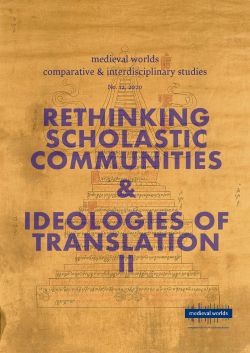|
 |
medieval worlds provides a forum for comparative, interdisciplinary and transcultural studies of the Middle Ages. Its aim is to overcome disciplinary boundaries, regional limits and national research traditions in Medieval Studies, to open up new spaces for discussion, and to help developing global perspectives. We focus on the period from c. 400 to 1500 CE but do not stick to rigid periodization.
medieval worlds is open to submissions of broadly comparative studies and matters of global interest, whether in single articles, companion papers, smaller clusters, or special issues on a subject of global/comparative history. We particularly invite studies of wide-ranging connectivity or comparison between different world regions.
Apart from research articles, medieval worlds publishes ongoing debates and project and conference reports on comparative medieval research.
Rethinking Scholastic Communities in Medieval Eurasia
Guest Editors: Pascale Hugon and Birgit Kellner
Rethinking Scholastic Communities in Medieval Eurasia: Introduction
Pascale Hugon and Birgit Kellner
Rethinking Scholastic Communities in Latin Europe:
Competition and Theological Method in the Twelfth Century
Constant J. Mews
Rethinking Buddhist Scholastic Communities Through a Socio-Historical Lens
José Ignacio Cabezón
Myang ral Nyi ma ’od zer (1124-1192):
Authority and Authorship in the Coalescing of the rNying ma Tantric Tradition
Cathy Cantwell
Between disputatio and Polemics: Dialectics as Production of Knowledge in the Middle Ages
Bénédicte Sère
The Tibetan Institutionalisation of Disputation: Understanding a Medieval Monastic Practice
Jonathan Samuels
Ideologies of Translation, II
Hostili praedo ditetur lingua latina: Conceptual Narratives of Translation in the Latin Middle Ages
Réka Forrai
Multilingual Sermons
Guest Editor: Jan Odstrčilík
Multilingual Medieval Sermons: Sources, Theories and Methods
Jan Odstrčilík
Multilingual Texts as a Reflection of Code-Switching in Medieval England: Sermons and Beyond
Herbert Schendl
Orality in its Written Traces: Bilingual reportationes of Sermons in France (Thirteenth Century)
Nicole Bériou
Bilingualism in Medieval Italian Preaching: The Case of Angelo da Porta Sole (d. 1334)
Carlo Delcorno
Bilingual Strategies in Fourteenth-Century Latin Sermons from Catalonia
Lidia Negoi
Typology and Spectrum of Latin-Irish and Latin-English Codeswitches
in Medieval Sermon Literature
Tom ter Horst
Review Article
Review Article: How Far is Global?
Roy Flechner
|




 Home
Home Print
Print
 References
References
 Share
Share
